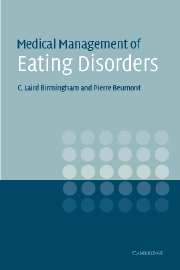PART IV - THE PSYCHIATRIC AND PSYCHOLOGICAL PERSPECTIVE
Published online by Cambridge University Press: 18 December 2009
Summary
Introduction
The purpose of this part of the book is different from that of the first half. Here, the aim is to provide information about the psychiatry, psychology, and sociology of AN and related eating disorders. It will discuss assessment, prevention, and psychological treatment, but it is not meant to be a definitive guide on these matters, as the first part is on medical treatment. The intended audience remains the same: health care workers of all disciplines who are involved in the care of patients suffering from AN or one of its related eating disorders. Others in the community may also find items of interest in the book — such as members of the legal profession, school teachers, welfare workers, and even parents, relatives, and friends of patients who have or have had these illnesses. However, because health care workers are the primary audience, the book contains much that is technical in medicine. No attempt has been made to explain or clarify the technicalities.
This part is concerned with the psychiatry, psychology, and sociology of eating disorders. For those health workers who have not been trained in mental health per se, it offers a review of the mainstream ideas of those psychiatrists and psychologists who have a particular interest in these illnesses. Because some of the concepts used in psychiatry and psychology are unfamiliar to other health care professionals, it includes some clarification of psychiatric and psychological terms.
- Type
- Chapter
- Information
- Medical Management of Eating DisordersA Practical Handbook for Healthcare Professionals, pp. 205 - 208Publisher: Cambridge University PressPrint publication year: 2004



